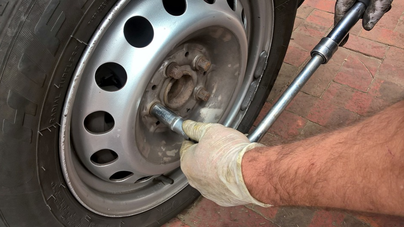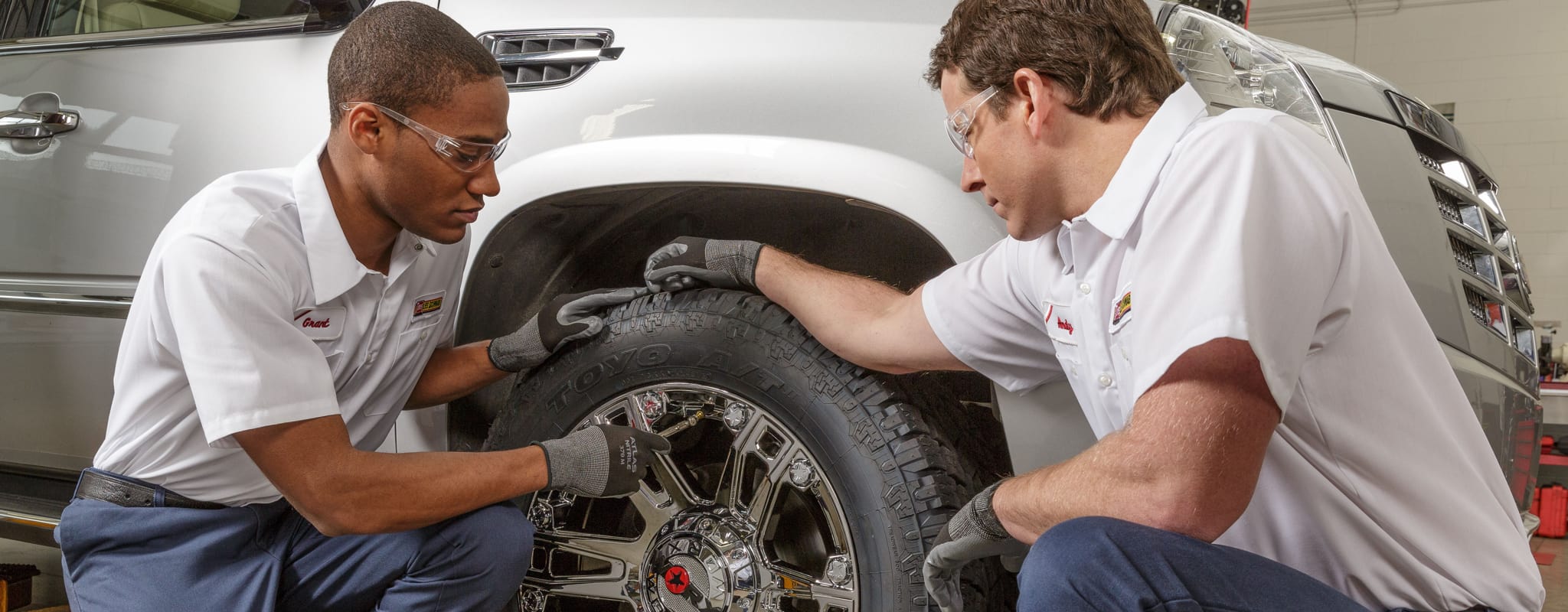Obtain Road-Ready with Expert GMC Tires Service at Morris Tires
Obtain Road-Ready with Expert GMC Tires Service at Morris Tires
Blog Article
Tire Solution: The Impact of Climate Condition
When it comes to guaranteeing ideal efficiency and safety and security on the road, comprehending the effect of weather conditions on tire service is important. GMC Tire Service. In this discussion, we will certainly check out the complex relationship between climate problems and tire solution, dropping light on the importance of weather-specific tire maintenance methods and factors to consider.
Heat and Tire Performance
When exposed to heats, tires experience modifications in efficiency that can significantly affect car safety and handling. The warmth created from long term driving or hot climate problems creates the tire rubber to soften, resulting in decreased walk life and increased wear. As the rubber ends up being softer, the tire's grip on the roadway diminishes, affecting stopping ranges and general grip. In extreme situations, too much heat can even cause tire blowouts, posing an extreme safety and security danger to the lorry and its owners.

Cold Climate Effects
Cold weather problems can have a considerable effect on tire performance and safety. In chilly weather condition, tires might also lose air pressure more rapidly, which can affect handling and gas efficiency.
To mitigate the effects of chilly weather condition on tires, it is crucial to regularly inspect tire stress and inflate them to the producer's suggested degrees. Making use of wintertime or all-season tires created for chilly weather problems can likewise improve traction and grasp on icy or snowy roadways. Correct tire maintenance, including regular examinations for wear and damage, ends up being much more crucial throughout colder months to make sure optimal performance and security.
Rainy Issues Effect
During wet conditions, tire efficiency and safety and security can be dramatically influenced by the wet roadway surfaces and lowered visibility. The tread pattern of tires plays an essential function in maintaining traction on wet roadways. Tires with worn-out treads are extra prone to hydroplaning, where a layer of water constructs up in between the tire and the roadway surface area, leading to loss of grip. To fight this, vehicle drivers should regularly evaluate their tires for appropriate walk deepness and think about investing in tires especially developed for wet problems.
Furthermore, stormy weather can likewise decrease exposure, making it testing for chauffeurs to see the road in advance clearly (GMC Tire Service). In such problems, it is vital to change driving rates appropriately and keep a safe complying with distance to permit sudden stops. Effectively inflated tires can also aid in maintaining control on wet roadways by supplying much better handling and grasp
Snow and Tire Safety And Security
When driving in snowy conditions, having the ideal tires can make a significant distinction in safety and performance. Winter months tires are created with unique rubber compounds and step patterns to supply much better grip on snow and ice compared to all-season tires.

It is important to comply with supplier directions when making use of and installing tire chains to stop damages to the tires and lorry. By choosing the ideal tires, maintaining appropriate inflation, and thinking about extra traction help like tire chains, chauffeurs can boost their security when browsing snow-covered roads.
Weather-Related Tire Upkeep
When confronted with various weather, correct tire upkeep ends up being a critical element of lorry safety and security and efficiency. Weather-related tire upkeep includes a variety of techniques focused on making sure optimal tire feature and longevity in various climate situations. One crucial facet of weather-related tire maintenance is tire stress law. Changing temperature levels can cause tire pressure to differ, impacting grip and fuel efficiency. Frequently readjusting browse around here and checking tire stress according to supplier suggestions is vital for secure driving in transforming climate conditions. In addition, tire tread depth plays a significant role in taking care of various climate aspects. Tires with adequate step deepness give far better hold on damp or icy roadways, lowering the danger of skidding or hydroplaning. When walk wear gets to a specific deepness is crucial for preserving traction and security in adverse weather condition, inspecting tire tread consistently and replacing tires. By focusing on weather-related tire upkeep, motorists can improve security, improve car efficiency, and lengthen the life expectancy of their tires.
Final Thought
To conclude, climate condition have a significant effect on tire efficiency and safety and security. From warmth influencing tire pressure and wear to browse this site cool weather lowering traction, it is necessary to take into consideration the weather when keeping and making use of tires. Stormy problems can reduce grasp and bring about hydroplaning, while snow can raise the risk of accidents if tires are not effectively furnished. Weather-related tire maintenance is crucial in guaranteeing optimal performance and safety and security when traveling.
In this discussion, we will certainly check out the detailed relationship in between climate conditions and tire service, shedding light on the value of weather-specific tire maintenance methods and considerations.

Report this page